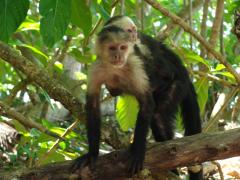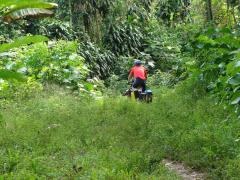Costa Rica: Just a quick visit
One of the delights of bike touring is that you spend most of your time in between big important tourism centers, instead of just going from one gringo hotspot to another. We get to meet ordinary people who are fascinated with us and have lots of questions and freely share their time and enthusiasm with us. And they are ordinary people who have not gotten jaded or tired of gringos or tourists. This is how the vast majority of our time in Mexico and Central America has been.
Then comes the famous tourist mecca of Costa Rica. Even though we've been here before, we didn't realize that the entire country has transformed itself into one huge vacation resort, almost an eco-Disneyland. We hardly passed a mile-long stretch in the whole country that didn't have tourist facilities and a sign in English. And we weren't in the main tourist part of the country! We probably didn't stay anyplace where there wasn't somebody that spoke English. Costa Rica is doing a fantastic job catering to tourists from all over the world, including all over Europe, the US and Canada, the Far East, and even places like Argentina. And there are no armed guards at the banks, which is a good sign. And it seems every town has a beautiful bakery where you can get fresh baked goods early in the morning.
This is all great news for the ordinary tourist: great services, easy living, great eco-tourist opportunities in rainforests and beaches. But it came as a bit of a shock to us after so much time being treated as rock stars by all the delightful people of rural Central America. Suddenly we were just ordinary gringos, like the people there every day, an economic force in the country, not a crazy curiosity. Instead of calling out "Gringo!" as we passed, people didn't even look at us, and might not even say hello when we greeted them in passing. It was quite a shock. An understandable one, but a shock nonetheless.
The economy and standard of living here are far above what we've seen elsewhere. Although we saw a few obviously poorer houses in Costa Rica, they generally had TV antennas, meaning that they had electricity (and we'd bet on running water, a luxury in many parts of Central America). Where we would see two or three tire-flat repair shacks in an ordinary town in Nicaragua, in Costa Rica, in one small town, we saw two car decoration and upgrade businesses, advertising all kinds of add-ons to your vehicle, including paint jobs, alarms, and the like.
All through Central America the vast majority of the buses have been old retired schoolbuses from the US, many still sporting the name of the school district where they used to haul school children. In Costa Rica they have big, beautiful, shiny buses like the great buses of Mexico.
The roads of Costa Rica were not as good for cycling as we had followed in the rest of Central America, even though we had planned carefully to avoid the terrible congestion of the Central Valley and the Pan American highway. Most of our route was OK, and some was delightful, but a fair bit had too many cars, trucks, and buses for the narrow, narrow roads. And then we hit the main east-west highway, and it was intolerable for cycling. We got on a bus for the 80 kilometers to Puerto Viejo. You could probably ride it, but you would give up bike touring if you rode much of this kind of road.
We did have a delightful stay in Cahuita, a little beach town on the Caribbean coast, enjoying the easy hospitality of the Caribbean blacks in the neighborhood. The national park there was delightful, but the coral reef has been devastated by a number of the negative forces working on reefs everywhere, but mostly by snorkelers breaking the coral.
One odd note where Costa Rica is behind: It has long had a pretty strong central government, and many things that are deregulated in other countries have not been deregulated here. You can buy a new cellphone and get immediate prepaid service in any little town in Central America. But not in Costa Rica. The government telecommunications monopoly is still the only game in town, so you have to sign up for a telephone line, wait for one to become available, and sign a contract.
Other good things: No guards with submachine guns at the bank. There's a fancy bakery in almost every town that opens at 5am. And the water is drinkable almost everywhere.
But we were happy to be the center of attention less than two miles into Panama, when the kids started calling out to us again!



